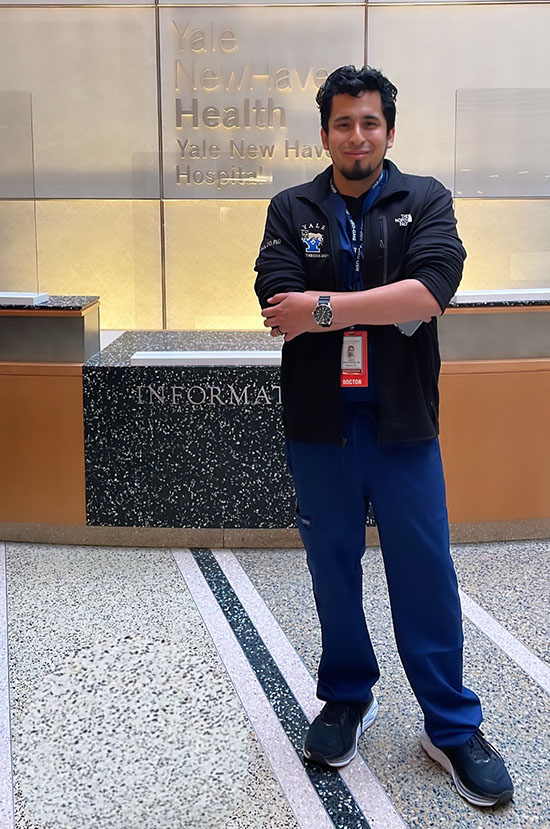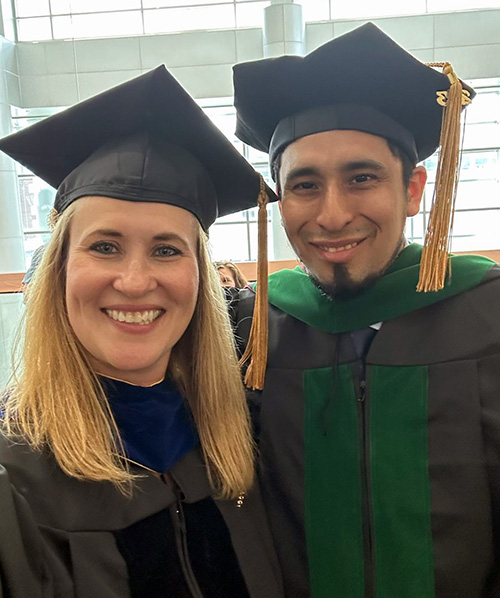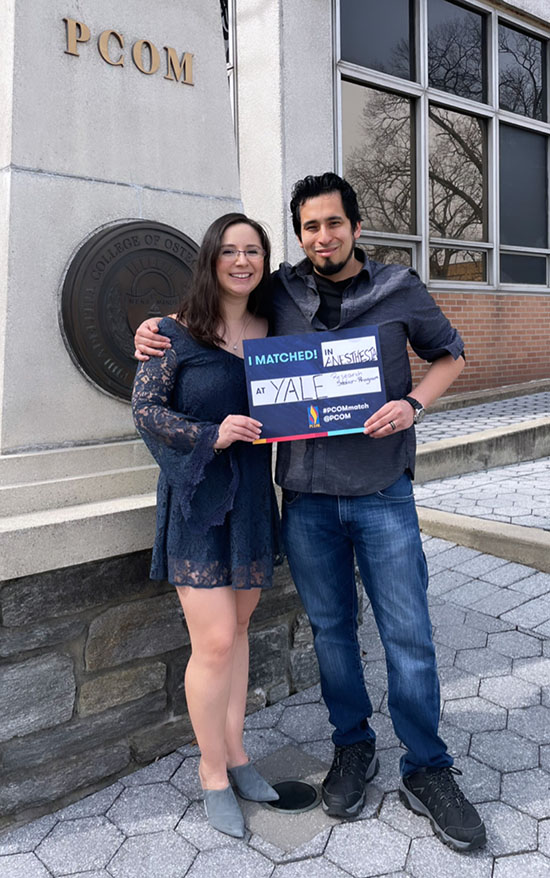DO/PhD Graduate Continuing Research During Residency at Yale
August 17, 2023Born and raised part of his childhood in Lima, Peru, David R. Garcia Castro, DO, PhD
'23, moved to Phoenix in 1997 with his brother and parents. From his teenage years
on, Garcia wanted to be a doctor. Volunteering at a local community hospital for two
years exposed him to varied and serious medical situations. He vividly remembers how
a patient in his mid-30s battling ALS gave him perspective on how helping others can
be therapeutic to the heavy difficulties of growing up in a low-income immigrant household
in Arizona.
He graduated from Northern Arizona University in 2012 and worked in the biotechnology
industry, focusing on infectious disease assay development, in Maine for a few years
as he considered his next step. Philadelphia College of Osteopathic Medicine (PCOM) landed on his radar in 2015. A year later, Garcia started a dual DO/PhD program at PCOM, becoming the College's third student to do so.
Structured as a seven-year program, Garcia spent his first two years in medical school,
worked primarily on his PhD for the middle three (though he got a jump on research
early), and finished with his clinical rotations before graduating in May. Now, he's
in his first year as an anesthesiology resident at Yale New Haven Hospital.
It's been quite a journey, in no small part due to the COVID-19 pandemic hitting during
his years in the lab of Heather L. Montie, PhD, an associate professor of Neuroscience, Physiology and Pharmacology at PCOM. During
the height of the pandemic, Garcia worked masked in the lab by himself, taking turns
with Montie to advance experiments.
Garcia said Montie guided him through the process to finish multiple requirements,
both by PCOM and the University of the Sciences, which helped to administer the PhD
program. His major program tasks included a grant submission, comprehensive exam,
dissertation and dissertation defense, as well as quarterly checkpoints to help ensure
progress.
“Dr. Montie and I both have personally grown a lot through this process,” Garcia said,
noting that he was her first PhD student. “We are close colleagues. I still talk to
her all the time about the lab and our families. It's been a journey for both of us,
and we had to really bond during COVID. We were the fort that held down the lab, though
we had wonderful masters, biomedical and medical students rotate through in the years
I was there.”
Finishing the program was a team endeavor, with Garcia also crediting Jocelyn Lippman-Bell, PhD, an associate professor of Neurobiology and Pharmacology at PCOM, for serving on
his dissertation committee.
“These are people who are directly responsible for getting me through my program,”
he said. “I couldn't have done it without them.”
Garcia said he wanted to specialize in anesthesia for residency because, during his
OR clerkships, he always gravitated to the head of the bed, quickly fell in love with
the technicality and humbling aspects of anesthesia, and found he could not see himself
doing anything else in life. He chose Yale because he was also accepted to Yale's
anesthesiology Research Scholars Program, which offers a formal research program in
addition to anesthesiology training.
There was an added benefit in that the residency program coordinator had roots in
Philadelphia and was familiar with PCOM and its leadership. “He was well aware of
PCOM before even meeting me, which is nice for Yale to be aware of that,” Garcia said.
A recent outcome of his DO/PhD program is a journal article published in iScience for which Garcia is the primary author (Montie is senior author), which found that
a combination approach of increasing the SIRT3 protein and inhibiting PARPs (poly-ADP
ribose polymerase) helps rescue motor endurance of mice modeling the neuromuscular
disease spinal bulbar and muscular atrophy (SBMA), also known as Kennedy's disease.
Garcia said the experimentation process was illuminating, as the transition from cellular
to live models didn't always pan out, as some cell models showed dramatic results,
such as the prevention of toxicity, but when bringing the interventions to mice, they
weren't as effective.
“A PhD really teaches you how to evaluate any problem—whether research or not—think
them through, and come up with solutions and compartmentalize,” Garcia said.
Above all, the program continued to hone his resilience, and it showed him that you
can't do it alone.
Garcia said his wife, Jacqueline Ortiz, who is now a post-anesthesia care unit (PACU)
nurse at Yale, is his rock and that he wouldn't be here if not for her unwavering
support for the last 13 years. Additionally, he credited his parents. “My parents
have always been there for me,” Garcia said. “I've lived away from them for over 10
years now, but they are always a phone call away.”
About Philadelphia College of Osteopathic Medicine
Established in 1899, Philadelphia College of Osteopathic Medicine (PCOM) has trained
thousands of highly competent, caring physicians, health practitioners and behavioral
scientists who practice a “whole person” approach to care—treating people, not just
symptoms. PCOM, a private, not-for-profit accredited institution of higher education,
operates three campuses (PCOM, PCOM Georgia and PCOM South Georgia) and offers doctoral degrees in clinical psychology, educational psychology, osteopathic
medicine, pharmacy, physical therapy, and school psychology. The college also offers
graduate degrees in applied behavior analysis, applied positive psychology, biomedical
sciences, forensic medicine, medical laboratory science, mental health counseling,
physician assistant studies, and school psychology. PCOM students learn the importance
of health promotion, research, education and service to the community. Through its
community-based Healthcare Centers, PCOM provides care to medically underserved populations.
For more information, visit pcom.edu or call 215-871-6100.
Contact Us
For general media inquiries, please contact the Office of Marketing and Communications
at 215-871-6300 or communications@pcom.edu. Visit our media relations page to view contact information for public relations personnel.
Connect with PCOM

 Born and raised part of his childhood in Lima, Peru, David R. Garcia Castro, DO, PhD
'23, moved to Phoenix in 1997 with his brother and parents. From his teenage years
on, Garcia wanted to be a doctor. Volunteering at a local community hospital for two
years exposed him to varied and serious medical situations. He vividly remembers how
a patient in his mid-30s battling ALS gave him perspective on how helping others can
be therapeutic to the heavy difficulties of growing up in a low-income immigrant household
in Arizona.
Born and raised part of his childhood in Lima, Peru, David R. Garcia Castro, DO, PhD
'23, moved to Phoenix in 1997 with his brother and parents. From his teenage years
on, Garcia wanted to be a doctor. Volunteering at a local community hospital for two
years exposed him to varied and serious medical situations. He vividly remembers how
a patient in his mid-30s battling ALS gave him perspective on how helping others can
be therapeutic to the heavy difficulties of growing up in a low-income immigrant household
in Arizona. Garcia said Montie guided him through the process to finish multiple requirements,
both by PCOM and the University of the Sciences, which helped to administer the PhD
program. His major program tasks included a grant submission, comprehensive exam,
dissertation and dissertation defense, as well as quarterly checkpoints to help ensure
progress.
Garcia said Montie guided him through the process to finish multiple requirements,
both by PCOM and the University of the Sciences, which helped to administer the PhD
program. His major program tasks included a grant submission, comprehensive exam,
dissertation and dissertation defense, as well as quarterly checkpoints to help ensure
progress. “A PhD really teaches you how to evaluate any problem—whether research or not—think
them through, and come up with solutions and compartmentalize,” Garcia said.
“A PhD really teaches you how to evaluate any problem—whether research or not—think
them through, and come up with solutions and compartmentalize,” Garcia said.